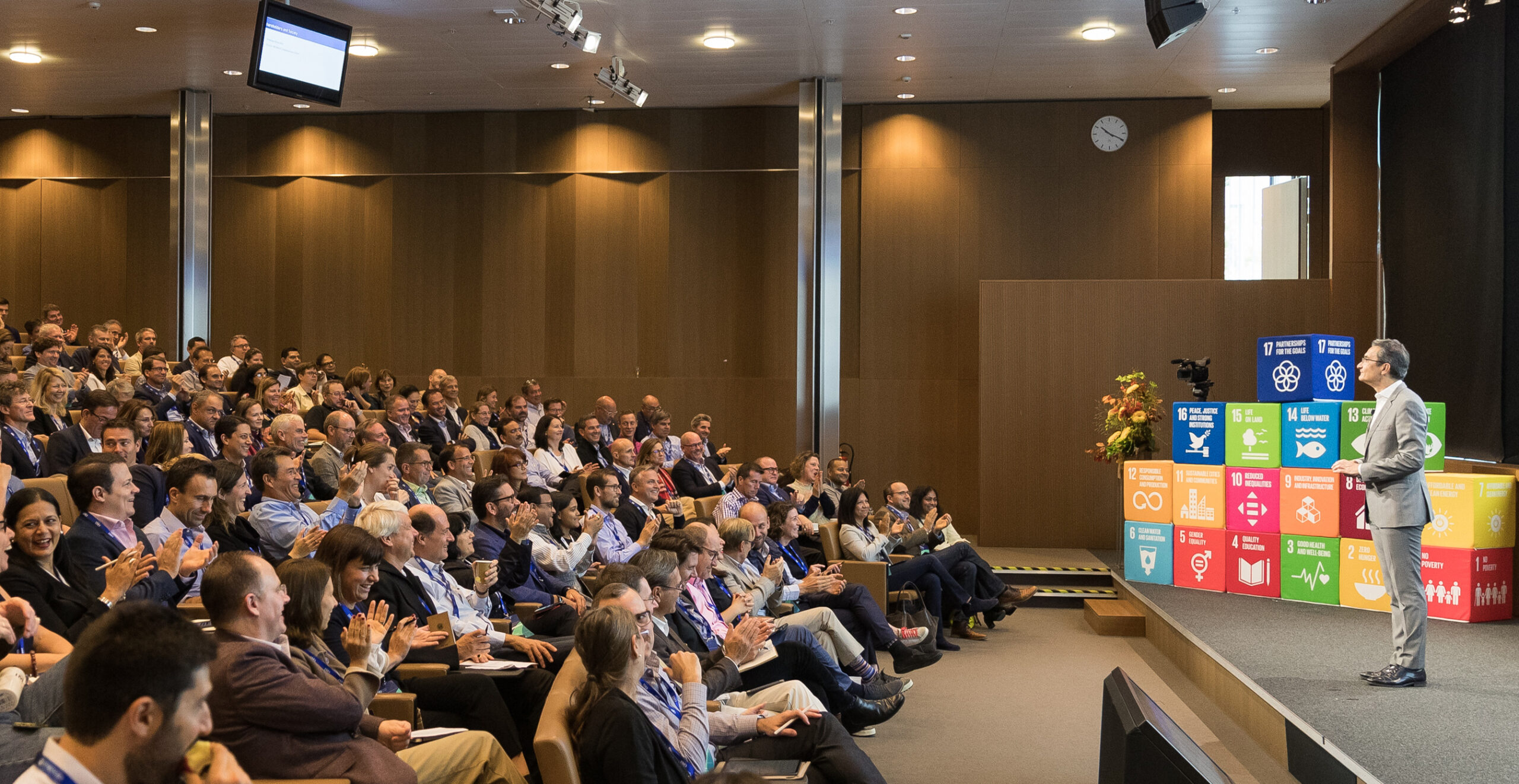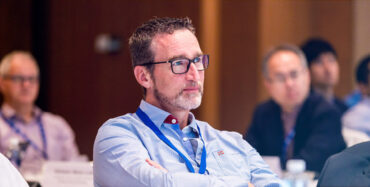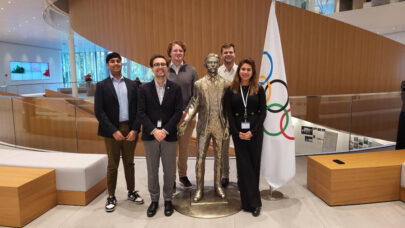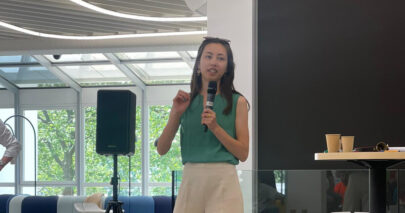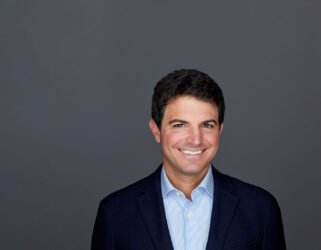Doing well by doing good, the role of sustainability in business, coping with change and how to find hope in an increasingly fractured world – just some of the key themes which ran through the Annual Alumni Event 2019 on 27-28 September.
The meeting saw 350 former participants gather at the IMD campus for two days of speeches and panels exploring the role of leadership in meeting the global challenges.
Here are some highlights from the event.
Shared responsibility
Jean-François Manzoni, President of IMD, kicked-off the event with a talk on the importance of “doing well by doing good” – an approach to business that he says is becoming ever more important in today’s world.
If an organisation can find an innovative and intelligent way to solve one of the world’s problems, then they should succeed financially, said Professor Manzoni.
This transformation is being driven by a powerful new force – a society which is demanding change. The divide between the concerned citizen and business executive has narrowed, and soon it will only be possible to do well by contributing to society.
Read more: If you don’t know how to fix it, please stop breaking it
Eagles vs ostriches
“Economic growth at the expense of the environment and society is not acceptable,” said Annika Falkengren, Managing Partner at Lombard Odier and IMD Foundation Board Member in her keynote speech.
We are witnessing a global movement against this, she added. This sustainability revolution is also, of course, a huge opportunity – but only for those businesses who react accordingly. To demonstrate her point, Falkengren described how businesses can now be split into two categories – ostriches and eagles.
The ostriches are those burying their heads in the sand, failing to see or act upon the need for a sustainable growth strategy. Eagles, on the other hand, have a far-sighted vision and are committed to this sustainability revolution.
The eagles, of course, will be the winners of the sustainability revolution.
Read more: If you don’t know how to fix it, please stop breaking it
Leadership, responsibility, action and hope
Humans have three strategies to help them cope with change, said Susan Goldsworthy, Affiliate Professor of Leadership and Organizational Change at IMD: “denial, distraction and despair.” For many of us, caught up in our day-to-day lives, distraction is the one we do most.
But there is a fourth way to adapt to change – to engage in dialogue and to give each other hope that something can be achieved. This hope is contagious, and if we nurture and propagate it together, we can make a difference in this magical, more-than-human world.
Read more about Susan Goldsworthy’s new book, Where the Wild Things Were here.
Four steps to effective dialogue
In today’s divisive world, we need this constructive dialogue more than ever, said Nadine Hack, CEO of beCause Global Consulting. She listed four factors for successful collaboration and dialogue:
Firstly, everyone involved in a collaboration must be clear about what they are willing to put in, and what they want to take out. Secondly, you must encourage people to go beyond their own territorial positions and see the bigger picture.
Thirdly, offer ongoing nurturing. You must stay in touch with the people you work with, learn from each other, and recreate these bonds over and over.
Finally, we must reveal our own humanity and find humanity in others, Hack said. In our divided world, common ground can be hard to find, but we are all human beings sharing the same concerns; the health and happiness of our families and the safety and prosperity of our communities.
Read more: Susan Goldsworthy and Nadine Hack on leadership, responsibility, action and hope
The role of regulation
Arturo Bris, IMD Professor of Finance and Director of the World Competitiveness Center injected a note of pragmatism into the alumni event when he challenged the audience to consider the regulatory frameworks demanded by a planet in crisis.
Ensuring food security, and taking a stand on continued investment in ‘sin stocks’, such as fossil fuels, weapons and tobacco, would, he said lead to a confrontation between existing industry standards and regulation for the greater good.
“Sustainable Development Goal 17 states that we must strengthen and revitalise the global partnership for sustainable development,” Professor Bris reminded alumni. “The public and private sector must work together – are we ready for that?”
Professor Bris referred to the fundamental cultural shift that the environmental crisis will demand from industry and politics. Instead of allowing the private sector to regulate itself, government will be called upon to play a central role in shaping regulation around what and how investment occurs. Furthermore, industry will have to respond to that favourably.
“When it comes to dilemmas – real dilemmas – we, as executives, do not have the resources to solve them by ourselves. We need public policy,” he stated. “Are you willing to sacrifice the political system to support the SDGs?”
Read more: Are you ready for a cultural shift in industry’s relationship to regulation?
Purpose over profit
As CEO of clean aquaculture provider Novaton, Isaam Kabbani has committed to investing in providing clean technology and clean energy solutions to the production of shrimp and seafood.
“For governments, it is about ensuring food security, jobs, micro-economies: in Indonesia fishers can produce clean, export-quality fish and for that, government has lowered barriers to us, changing laws to help us because they believed in our goals, ” he said.
Purpose will sometimes contradict profit margins, he stated. However, aligning with purpose over profit will ultimately enable companies to offer shareholders a win-win opportunity.
Read more: Are you ready for a cultural shift in industry’s relationship to regulation?
Marketing as a force for good
“Marketing has been the daughter of globalization and marketing will be the mother of sustainability.” So said Frédéric Dalsace, IMD Professor of Marketing and Strategy as he addressed participants.
Professor Dalsace outlined the historical development of marketing as a tool for efficient communication between vendors and customers and defined its key role in the shift towards more sustainable production.
Marketing’s inherent visibility will be its strength, as it shifts the dial on concepts such as co-organizing the more efficient use of resources, promoting the sharing economy and essentially advance the shift from a linear to a circular economic model.
“Marketing can help further more efficient development and production processes – making sure that as a society we squeeze the lemon: use every scrap of resources and we can persuade towards a more efficient product usage,” he said.
Read more: Marketing will be a key communicator of the shift towards ethos-driven consumption
Fighting fast fashion
IMD alumni and CEO of Neovili Milena Amaral is using her considerable professional experience of Brazil’s fast-fashion industry to create a platform for the fashion industry to measure its ecological footprint across its supply chain.
Amaral has created a platform that diagnoses, measures and suggests corrections to industry players interested in assessing the footprint of their products.
Despite the steady increase in awareness from the fashion industry, Amaral pointed out that emerging markets present a challenge to innovators and changemakers.
“It is relatively easy to tell mature markets to slow down. Emerging markets, however, are excited consumers,” she said.
Read more: Marketing will be a key communicator of the shift towards ethos-driven consumption
Can China save the planet?
As the country that emits the most CO2 and creates 25% of the world’s plastic waste, China has work to do to clean up its environment, said Mark Greeven, Professor of Innovation and Strategy at IMD.
But it is also a breeding ground for some of the world’s boldest green initiatives; 25% of the world’s solar panels; a third of the planet’s wind turbines; the most comprehensive green finance mechanism and mobility solutions; and the world’s largest carbon trading market, amongst other things.
For Greeven, it is the commitment of China’s leaders that is driving change. The country is pushing other world leaders for a consensus on measurement standards and the planet’s first green guidelines, for example. Meanwhile, efforts to reduce coal consumption in China have already started to pay off – Beijing has now exited the list of the 200 most polluted cities in the world.
Businesses, NGOs, civil society and government are all part of the solution. One NGO, for example, has started offering tours of polluted areas and is working alongside business and government to map these areas and find a solution to the problem.
So will China save us? “It’s all about the collaboration but we’re not there yet,” said Greeven. “Only China can save the planet and I have a real hope that the country takes that responsibility and acts on it.”
Read more: Can China save the planet?
Promoting an ecological civilization
Rilito Povea, Deputy Director of the WWF in China, dispelled some of the myths about working with the country’s government. One of the Communist Party’s explicit goals is to promote an ecological civilization, he said.
But there are some hypocrisies to its strategy, he pointed out. While reducing coal at home, the country is still promoting it in many ‘One Belt, One Road’ countries.
The WWF works with both city governments and businesses in China to help them reach peak emissions by 2030 and then, once this groundwork has been laid for them, focus on their own efforts to reduce emissions.
China may be ultimately motivated by ensuring its own food security, but Povea agreed with Greeven that real progress will come about through partnerships between entrepreneurs, governments and civil society.
Read more: Can China save the planet?
Finding purpose
Vanina Farber, elea Professor of Social Innovation at IMD outlined the pathway to success in a tricky marketplace. Key to success, she said was identifying purpose, creating robust analytics for its assessment and signaling commitment to transformation through resourcing and messaging.
“Global trends have brought purpose inside the market space – you need to manage it. Not just with a nice statement on a page but a value proposition that convinces your customers, your staff and your kids,” she said.
Businesses must identify a sense of urgency to find their purpose. Using the timely example of Swedish activist Greta Thunberg, Professor Farber asked: “Why do we have such a visceral reaction to her? Is it that we know what we have to do, but we do not do it? Does her sense of urgency break through our inertia? Does her anger overcome our apathy?”
A significant shift between the aspirations of millennials compared to their parents’ generation was also worth considering, she said. While the older generation equated success with ownership, consumption and waste, their children placed more priority on qualitative factors, such as relationships, health, a less stressful lifestyle and goods that were built to last.
Professor Farber closed her comments with a call to action: “It is time to challenge what you are doing and think about what it could be,” she said. “I want to reframe Greta Thunberg’s question of ‘How dare you?’ to ‘Do you dare? We dare to join us in this quest, to have a positive impact and change the system for the better.”
Read more: Transforming business around purpose
